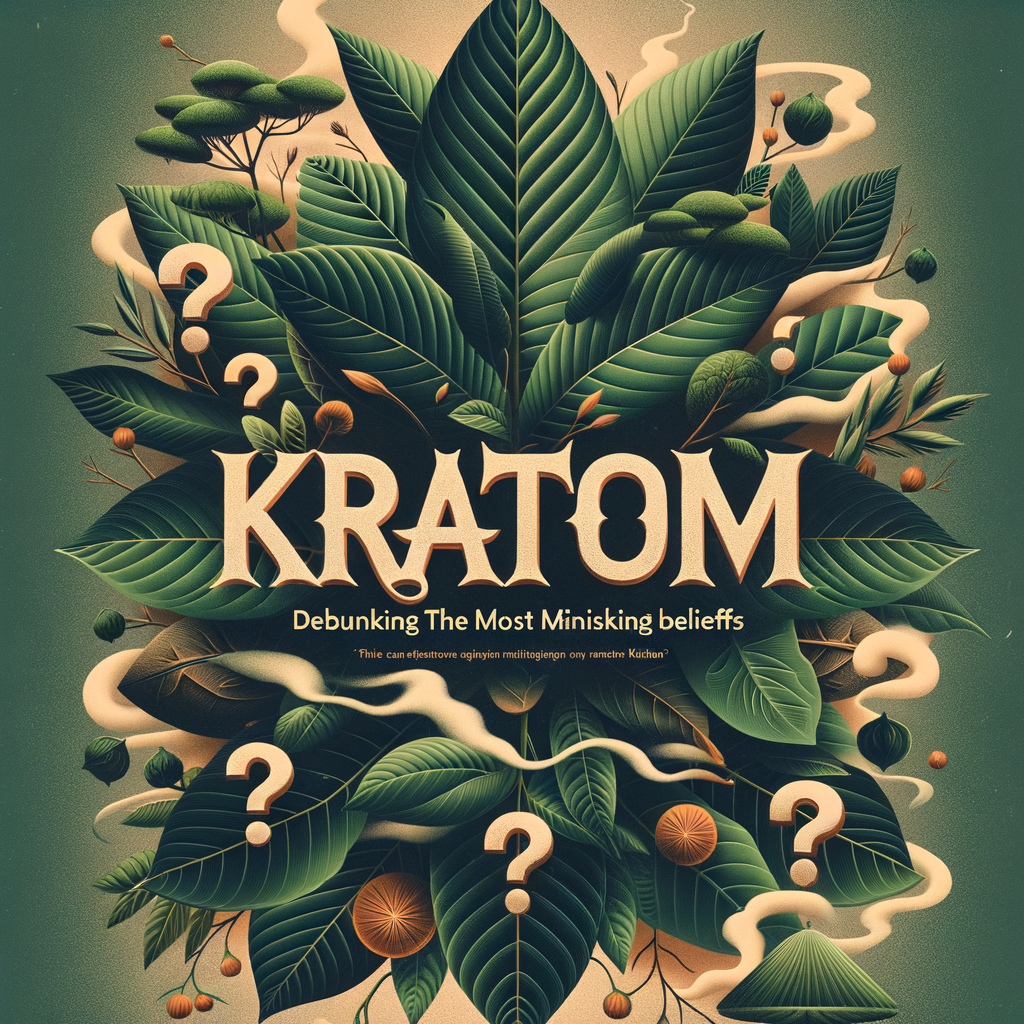
Kratom Myths: Debunking the Most Misleading Beliefs
- Introduction
- What is Kratom?
- Myth 1: Kratom is Just Another Opioid
- Understanding Kratom Strains
- Myth 2: Kratom Is Highly Addictive
- Signs of Dependency
- Myth 3: Kratom Has No Benefits
- The Science Behind Kratom
- Myth 4: All Kratom is the Same
- Quality Matters
- Myth 5: Kratom is Harmless
- Potential Side Effects
- Myth 6: Kratom is Illegal Everywhere
- State by State Overview
- Myth 7: You Can't Use Kratom with Other Substances
- Examples of Safe Combos
- Myth 8: Kratom is Not Natural
- Herbal Remedies in Context
- Myth 9: All Kratom Products are the Same Quality
- Evaluating Kratom Quality
- Myth 10: Kratom Should be Used as a Replacement for Prescription Medications
- The Importance of Consulting a Professional
- Conclusion
- Frequently Asked Questions
- References
Introduction

Kratom has rapidly gained popularity in recent years, sparking interest and debate across various communities. This herbal substance, derived from the leaves of the Mitragyna speciosa tree native to Southeast Asia, holds a unique position in alternative wellness practices. However, along with its popularity come a plethora of myths and misconceptions. It’s time to debunk those misleading beliefs and shine a light on the facts surrounding kratom.
Understanding kratom’s properties, benefits, and potential risks is essential for anyone considering its use. As more people seek natural remedies for wellness, the demand for accurate information grows. This article will tackle the most common kratom myths, helping you navigate through the noise and confusion.
What is Kratom?
Kratom has a long history of traditional use in countries like Thailand and Malaysia. Locals often consume kratom leaves to boost energy and reduce fatigue. In recent years, many users have turned to kratom for its potential medicinal properties.
The leaves contain active compounds called alkaloids, primarily mitragynine and 7-hydroxymitragynine. These compounds interact with the body’s opioid receptors, leading to various effects. While some people seek kratom for pain relief, others use it for mood enhancement or increased focus.
Above all, each person’s experience with kratom can differ significantly. Factors like dosage, strain, and individual body chemistry play vital roles in determining its effects. That said, let’s explore the myths that may cloud your judgment about kratom.
Myth 1: Kratom is Just Another Opioid
One of the most widespread myths is that kratom is simply another opioid. Although kratom interacts with opioid receptors in the brain, it does not fit neatly into the same category as prescription opioids.
Unlike substances like morphine or oxycodone, kratom affects each user differently. Some users experience stimulation, while others report sedation, depending on the strain and dosage. This variability sets kratom apart from traditional opioids, which usually deliver a more consistent response.
Understanding Kratom Strains
Kratom comes in various strains, each with distinct properties. For instance, red vein kratom typically offers pain relief and relaxation, while green vein kratom may enhance focus and energy. Users often find that choosing the right strain can help tailor their experience.
| Kratom Strain | Benefits | Effects |
|——————-|——————————-|——————-|
| Red Vein | Pain relief, sedation | Relaxing |
| Green Vein | Energy boost, focus | Uplifting |
| White Vein | Increased energy, alertness | Stimulating |
Myth 2: Kratom Is Highly Addictive
Many believe that using kratom leads to addiction, similar to other narcotics. However, existing research suggests that kratom’s addiction potential is lower than that of conventional opioids.
Access to several anecdotal reports shows that while some users develop a dependency, many others do not. It is essential to distinguish between psychological dependence and true addiction, as their implications differ widely.
Signs of Dependency
Individuals using kratom should monitor their usage. If you find yourself needing to increase your dose to achieve the same effects, this may indicate a developing dependency. Recognizing early signs can help manage usage smartly.
Myth 3: Kratom Has No Benefits
Another common myth is that kratom provides no health benefits, which could not be further from the truth. Advocates of kratom report various advantages, ranging from pain relief to mood enhancement.
The Science Behind Kratom
Research into kratom is still evolving, yet some studies indicate that it may help with:
– Chronic pain
– Anxiety and depression
– Opioid withdrawal symptoms
While not all claims are fully backed by rigorous scientific studies, user experiences continue to suggest that kratom may be a valuable tool in managing certain conditions.
Myth 4: All Kratom is the Same
Assuming that all kratom is identical oversimplifies this complex herbal remedy. Differences in origin, strain, and preparation significantly affect the potency and effects of kratom.
Quality Matters
The kratom market is diverse, with various vendors offering different forms. Whether you choose powdered kratom, capsules, or extracts, quality plays a pivotal role. Always opt for reputable sources that provide lab testing and transparent sourcing practices.
Myth 5: Kratom is Harmless
Contrary to the belief that kratom is entirely safe, it’s crucial to recognize that all substances carry risks. While some users may experience few adverse effects, others could face issues ranging from gastrointestinal discomfort to more serious reactions.
Potential Side Effects
Common side effects of kratom use may include:
– Nausea
– Dizziness
– Dry mouth
– Constipation
Always consult a healthcare professional before adding any new supplement to your routine to minimize risks and ensure safety.
Myth 6: Kratom is Illegal Everywhere
In the United States, kratom’s legal status surprises many. While it’s legal in some states, others have enacted bans. The variability in regulation often fuels misconceptions about the herb.
State by State Overview
| State | Legal Status |
|——————|—————–|
| California | Legal |
| New York | Legal |
| Alabama | Banned |
| Vermont | Legal |
| Tennessee | Banned |
Staying informed about your state’s regulations is vital. Knowing the laws will help you use kratom responsibly and avoid potential legal issues.
Myth 7: You Can’t Use Kratom with Other Substances
Many believe combining kratom with other substances is unsafe, but the reality is more nuanced. While it’s essential to exercise caution, combining kratom with certain supplements can yield positive results.
Examples of Safe Combos
Some users report benefits when mixing kratom with:
– Turmeric: For added anti-inflammatory properties.
– Ginger: To mitigate nausea.
– Caffeine: For enhanced energy.
Always consult a healthcare provider before combining kratom with other substances to ensure safety.
Myth 8: Kratom is Not Natural
Contrary to the belief that kratom is synthetic or chemically altered, it is a natural substance derived from a tree. Like many herbal remedies, its natural origins contribute to its appeal and popularity.
Herbal Remedies in Context
Herbal remedies, including kratom, often face skepticism in contrast to pharmaceuticals. Yet, many traditional herbal solutions have been used for centuries. Understanding the historical context of kratom helps appreciate its place in herbal medicine.
Myth 9: All Kratom Products are the Same Quality
Thirty different vendors may sell kratom, but that doesn’t mean their products are of equal quality. The lack of regulation in the kratom industry leads to variable quality across offerings, which can confuse potential users.
Evaluating Kratom Quality
To find high-quality kratom, look for:
– Third-party lab testing: Ensures the product is properly analyzed for purity and potency.
– Positive customer reviews: Feedback from prior consumers can indicate reliability.
– Transparency: Vendors should openly share sourcing information and practices.
Myth 10: Kratom Should be Used as a Replacement for Prescription Medications
Many people incorrectly assume that kratom can serve as a one-size-fits-all alternative for prescription medications. While it may help some individuals manage their conditions, it shouldn’t be used indiscriminately.
The Importance of Consulting a Professional
Healthcare professionals can guide appropriate use while considering potential interactions with existing medications. Self-medicating with kratom can sometimes lead to unintended consequences.
Conclusion
Understanding the reality surrounding kratom is essential for making informed decisions. The myths often overshadow its potential benefits and risks. By separating fact from fiction, users can navigate their journey with kratom more effectively.
Always remember that education is your best ally when it comes to health choices. Before introducing kratom or any supplement into your routine, consulting with a healthcare provider remains crucial.
Frequently Asked Questions
1. Is kratom safe for everyone to use?
Kratom may not be safe for everyone. Consult a healthcare professional before using it, especially if you have medical conditions or take medications.
2. What are the effects of different kratom strains?
Each kratom strain can produce different effects, such as relaxation, energy, or mood enhancement. Research to find the strain that suits your needs best.
3. Can kratom help with anxiety?
Some users report that kratom may help alleviate anxiety, but evidence is mostly anecdotal. More research is needed to validate its effectiveness.
4. How should I take kratom?
Kratom can be taken in various forms, such as powder, capsules, or extracts. Choose a method that fits your preferences and needs.
5. Is kratom legal in my state?
The legality of kratom varies by state. Check local laws for the most accurate information regarding its status.
6. What are the most common side effects of kratom?
Common side effects include nausea, dizziness, and constipation. Monitor your body’s reaction and consult a healthcare professional if you experience problems.
7. Can I combine kratom with other supplements?
Some users combine kratom with other herbal remedies, but always consult a healthcare provider for personalized advice.
8. How do I choose a reputable kratom vendor?
Look for vendors with positive reviews, third-party testing, and transparency regarding sourcing and production.
9. Will kratom show up on a drug test?
Most standard drug tests do not screen for kratom. However, specialized tests may detect its presence.
10. Can I build a tolerance to kratom?
Yes, regular use may lead to tolerance. Users might need to gradually increase their dosage to achieve the same effects.
References
– National Institute on Drug Abuse (NIDA): Understanding Kratom
– U.S. Food and Drug Administration (FDA): Kratom Safety
– American Kratom Association: Kratom Facts


